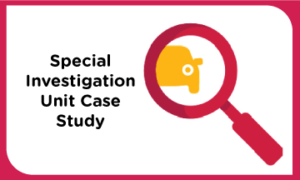“Jumping in,” also known as “passenger stuffing,” “opportunity fraud,” or “questionable occupancy,” is one of the most common types of auto insurance fraud. These terms are used to described situations in which an individual who was not in a vehicle at the time of an accident claims to have been present and submits claims for medical injuries. In investigating these claims, video evidence can be critical.
The Claims and Special Investigations Unit (SIU) Team at Maryland Auto Insurance recently identified and denied a fraudulent “jump in” case with a lucky assist from the Baltimore Police Department.
A Maryland Auto policyholder presented an auto Bodily Injury claim for himself and an alleged passenger. He reported that he had parked his vehicle on the street outside his residence, and the at-fault driver struck it while that he and his passenger were sitting in the car and listening to the radio. The policyholder never contacted the police about this incident.
Maryland Auto contacted the claimant driver, who provided his version of the facts, stating his vehicle collided with an unoccupied vehicle. Due to the conflicting stories, Maryland Auto’s Claims adjuster requested the SIU to conduct a follow-up investigation.
The detailed SIU investigation revealed that an unrelated accident occurred on the same street just prior to this accident. Baltimore City Police were already on scene, responding to the first accident. The responding officer looked up when he heard the second accident. As luck would have it, his body camera captured video footage of the unoccupied parked vehicle at the time of the collision.
When our SIU investigator confronted the policyholder with this video evidence, he still would not recant his version of the facts. He continued to claim that he and his passenger were in the vehicle and were injured due to this accident. With the video as evidence, ultimately, Maryland Auto denied the claim for questionable loss and misrepresentation of material facts.
The additional investigation by Maryland Auto’s Claims Department prevented payments for fraudulent claims that Maryland Auto did not owe.
Fraud costs auto insurers at least $29 billion per year* and the average American family pays an additional $1,000 in premium each year. Maryland Auto is working vigilantly to stop fraud. In 2019, more than $3.6 million in fraudulent claims were denied by Maryland Auto following investigations. In addition to using technology to combat fraud, our Special Investigations Team also provides yearly fraud training to the internal Claims Team and our network of Maryland Auto Authorized Producers. These training sessions are designed to educate attendees on common insurance fraud case types and inform participants how to properly identify indications of possible fraud and to report these instances for further investigation.
* Verisk Analytics, March 2017




